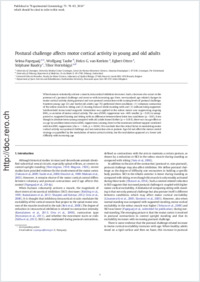Postural challenge affects motor cortical activity in young and old adults
- Papegaaij, Selma University of Groningen, University Medical Center Groningen, Center for Human Movement Sciences, Groningen, The Netherlands
- Taube, Wolfgang University of Fribourg, Department of Medicine, Switzerland
- Keeken, Helco G. van University of Groningen, University Medical Center Groningen, Center for Human Movement Sciences, Groningen, The Netherlands
- Otten, Egbert University of Groningen, University Medical Center Groningen, Center for Human Movement Sciences, Groningen, The Netherlands
- Baudry, Stéphane Université Libre de Bruxelles, Faculty for Motor Sciences, Laboratory of Applied Biology, Brussels, Belgium
- Hortobágyi, Tibor University of Groningen, University Medical Center Groningen, Center for Human Movement Sciences, Groningen, The Netherlands - Department of Sport, Exercise and Rehabilitation, Northumbria University, Newcastle-upon-Tyne, United Kingdom
-
23.11.2015
Published in:
- Experimental Gerontology. - 2016, vol. 73, p. 78–85
Balance
Aging
Postural activation
Voluntary activation
Transcranial magnetic stimulation
Intracortical inhibition
English
When humans voluntarily activate a muscle, intracortical inhibition decreases. Such a decrease also occurs in the presence of a postural challenge and more so with increasing age. Here, we examined age-related changes in motor cortical activity during postural and non-postural contractions with varying levels of postural challenge. Fourteen young (age 22) and twelve old adults (age 70) performed three conditions: (1) voluntary contraction of the soleus muscle in sitting and (2) leaning forward while standing with and (3) without being supported. Subthreshold transcranial magnetic stimulation was applied to the soleus motor area suppressing ongoing EMG, as an index of motor cortical activity. The area of EMG suppression was ~ 60% smaller (p < 0.05) in unsupported vs. supported leaning and sitting, with no difference between these latter two conditions (p > 0.05). Even though in absolute terms young compared with old adults leaned farther (p = 0.018), there was no age effect or an age by condition interaction in EMG suppression. Leaning closer to the maximum without support correlated with less EMG suppression (rho = − 0.44, p = 0.034). We conclude that the critical factor in modulating motor cortical activity was postural challenge and not contraction aim or posture. Age did not affect the motor control strategy as quantified by the modulation of motor cortical activity, but the modulation appeared at a lower task difficulty with increasing age.
- Faculty
- Faculté des sciences et de médecine
- Department
- Département de Médecine
- Language
-
- English
- Classification
- Biological sciences
- License
-
License undefined
- Identifiers
-
- RERO DOC 258965
- DOI 10.1016/j.exger.2015.11.015
- Persistent URL
- https://folia.unifr.ch/unifr/documents/304768
Statistics
Document views: 169
File downloads:
- pdf: 223
